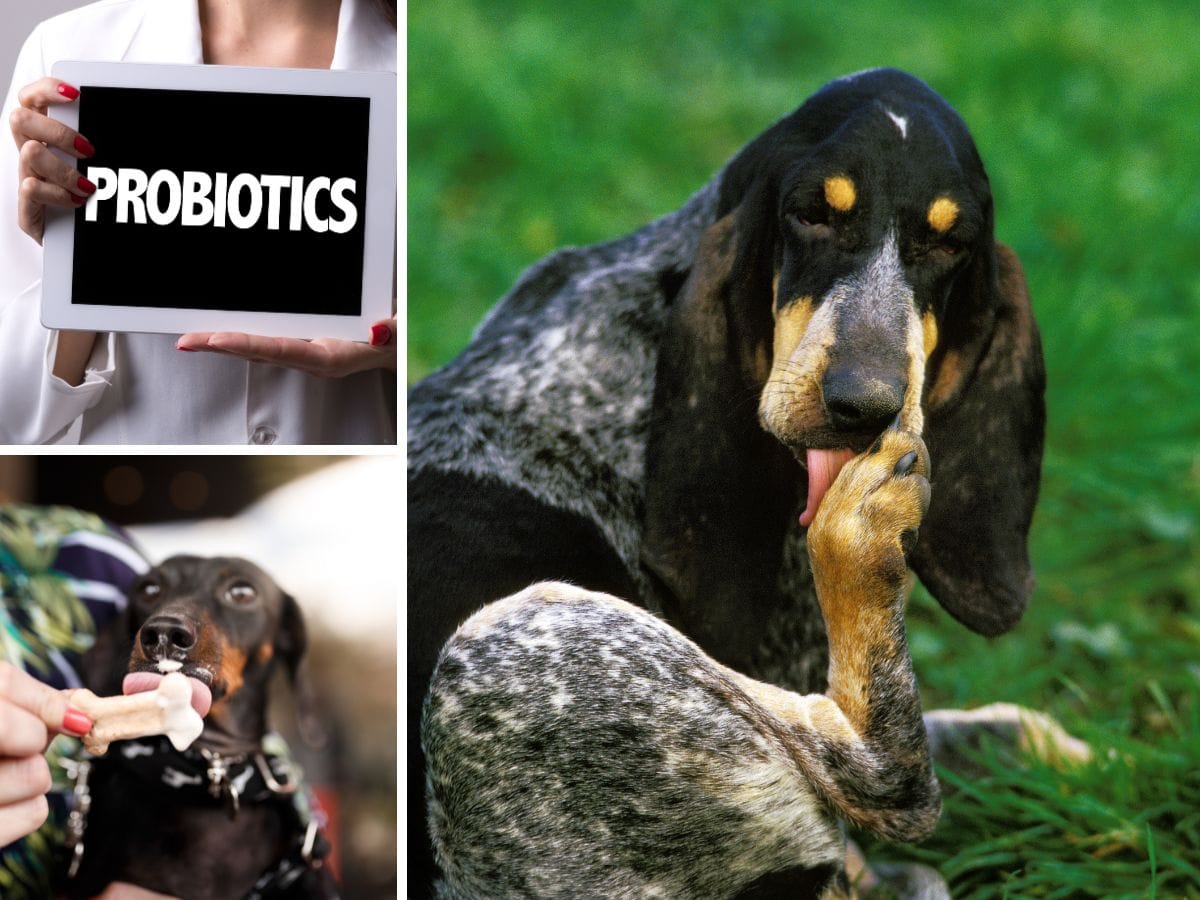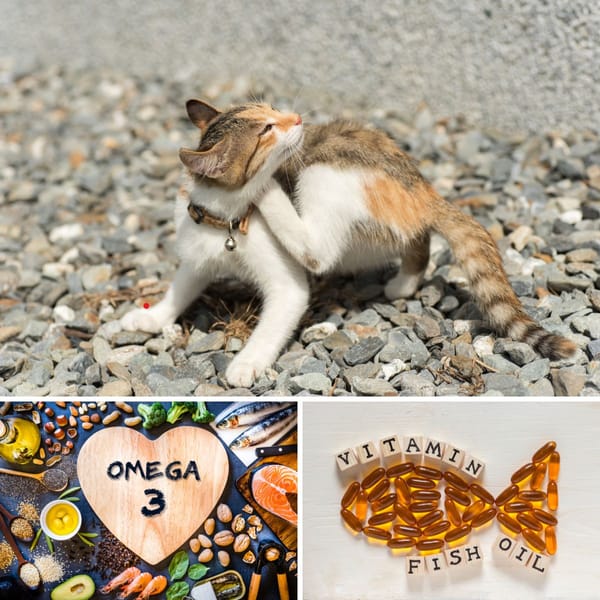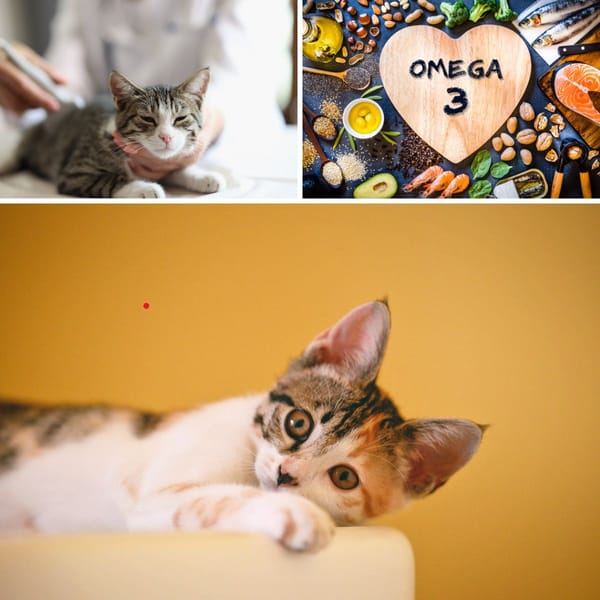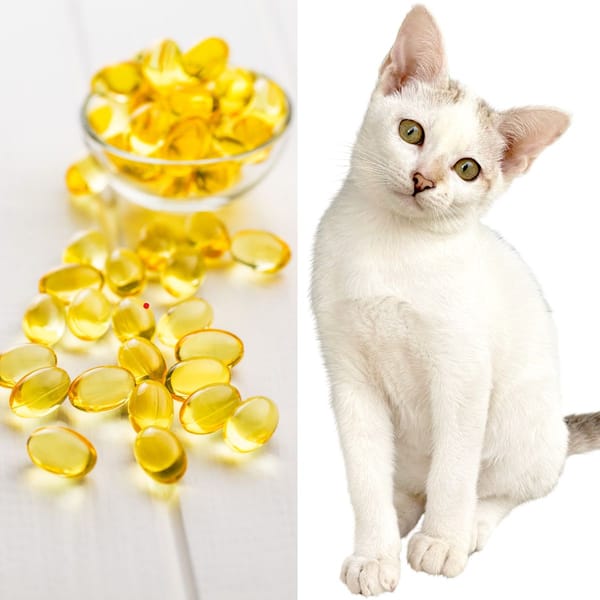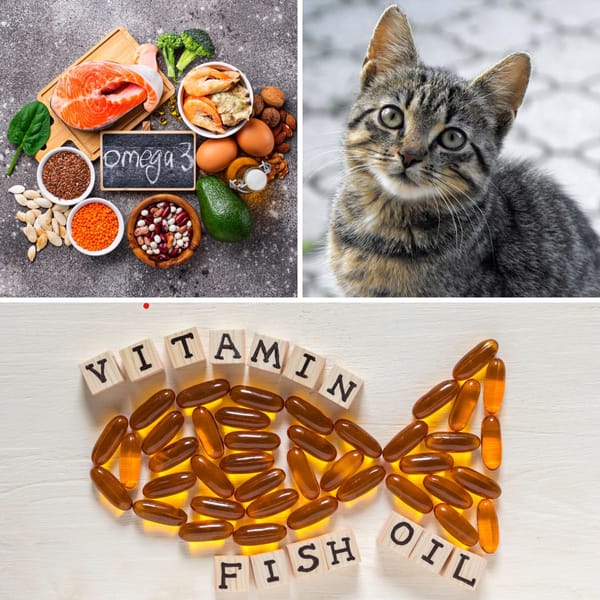Key Takeaways:
- Probiotics may help manage excessive paw licking in dogs by promoting a healthy gut and immune system.
- Addressing the root cause of paw licking, such as allergies or infections, is crucial for effective relief.
- Consultation with a veterinarian is recommended to determine the appropriate probiotic supplement and dosage for your dog.
Paw licking in dogs can be a common behavior, but when it becomes excessive, it may signal underlying health issues. Pet parents often wonder, "Do probiotics help dogs with licking paws?" This article delves into the potential benefits of probiotics for dogs with this issue, backed by scientific insights and practical advice.
Understanding Excessive Paw Licking in Dogs
Dogs lick their paws for various reasons, ranging from grooming to self-soothing. However, when dogs lick their paws excessively, it can lead to redness, inflammation, and even secondary infections. Identifying the cause of excessive paw licking is the first step in addressing the problem. Common causes include environmental allergies, food allergies, dry skin, and yeast infections.
The Role of the Gut Microbiome in a Dog's Health
The gut microbiome plays a crucial role in a dog's overall health, including their skin condition. A healthy gut is teeming with good bacteria that aid in digestion, nutrient absorption, and immune response. An imbalance in the gut microbiome can lead to health issues, including skin problems that may cause a dog to lick their paws excessively.
Probiotics and Their Impact on Dogs' Skin Health
Probiotics are live microorganisms that, when administered in adequate amounts, confer a health benefit on the host. For dogs, probiotics can help maintain a healthy balance of gut flora, which is essential for a robust immune system and healthy skin. By potentially reducing inflammation and allergic reactions, probiotics may offer relief for dogs with itchy skin.
Can Probiotics Reduce Inflammation and Itching?
Inflammation is a common symptom associated with excessive paw licking. Probiotics may help reduce inflammation by restoring balance to the gut microbiome and supporting the immune system. This, in turn, can alleviate itching and discomfort, potentially reducing the urge for dogs to lick their paws.
Addressing Yeast Infections with Probiotics
Yeast infections in a dog's paws can be extremely irritating and often lead to excessive licking. Probiotics can help combat yeast overgrowth by promoting the growth of good bacteria, which compete with yeast and other bad bacteria. This can help restore a healthy microbial balance and provide relief from itching.
Food Allergies and Probiotics: A Possible Solution?
Food allergies are a common cause of itchy skin and excessive paw licking in dogs. Probiotics may aid in managing food allergies by enhancing the gut barrier function and modulating the immune response. This could potentially reduce allergic reactions and the associated symptoms.
The Connection Between Stress and Paw Licking
Stress and anxiety can manifest as excessive licking in dogs. A healthy gut microbiome is linked to better mental health, and probiotics may play a role in reducing stress-related behaviors by promoting a balanced gut environment.
The Influence of Diet on a Dog's Digestive System and Skin Health
When it comes to maintaining a dog's gut healthy and supporting their overall well-being, diet plays a pivotal role. A balanced diet not only provides the necessary nutrients for a dog's body to function optimally but also contributes to a robust digestive system. Foods rich in fibers, prebiotics, and easily digestible proteins can help maintain a healthy gut flora, which is essential for a dog's digestion and absorption of nutrients. A well-functioning digestive system is less likely to develop issues such as diarrhea or constipation, which can lead to discomfort and excessive paw licking.
Moreover, what a dog eats can directly impact their skin health. Nutritional deficiencies or imbalances can lead to dry, flaky skin, making it extremely itchy and prone to irritation. Essential fatty acids, particularly omega-3 and omega-6, are crucial for maintaining healthy skin and a lustrous coat. If a dog's diet lacks these nutrients, they may start to exhibit signs of skin problems, such as hot spots or hair loss, which can lead to secondary infections and further exacerbate the urge to lick or chew their paws.
The Significance of Keeping a Dog's Gut Healthy
Maintaining a dog's gut health is like laying a strong foundation for a building; it supports the overall structure. A healthy gut in dogs is essential for proper digestion, absorption of nutrients, and a robust immune system. When a dog's digestive system is in top shape, it can effectively combat pathogens and regulate the body's internal environment. This balance is crucial because an upset stomach can lead to discomfort and stress, which might manifest as excessive paw licking or chewing. By ensuring your furry friend's gut health is optimal, you're setting the stage for a happier, more comfortable pet.
Furthermore, a dog's gut's healthy state is a deterrent against the overgrowth of harmful bacteria that can cause gastrointestinal issues. Probiotics are often recommended to maintain this delicate balance within the gut flora. They can aid in the prevention of yeast infections and other secondary infections that may arise from an imbalanced digestive system. A dog's diet that includes probiotics can fortify the gut's defenses, making it less likely for your dog to experience stomach upsets that lead to paw licking as a sign of discomfort.
Exploring the Link Between Probiotics and Secondary Infections in Dogs
When a dog persistently licks its paws, it can sometimes lead to open sores or wounds, making them susceptible to secondary infections. These infections can be bacterial or fungal, such as a yeast infection, which can further exacerbate the discomfort and the licking behavior. Probiotics, known for their beneficial role in a dog's gut-healthy ecosystem, may also play a part in fending off these opportunistic pathogens. By bolstering the dog's immune system through a healthier gut environment, probiotics could potentially reduce the risk of secondary infections taking hold.
Moreover, the presence of good bacteria in a dog's digestive system, supported by probiotics, can create a competitive environment for harmful microbes. This competition can prevent pathogenic bacteria and yeast from overgrowing and causing infections. A dog's diet enriched with probiotics might, therefore, not only improve their digestion but also act as a preventative measure against the complications that arise from excessive paw licking. It's a proactive step in maintaining a dog's health that could lead to fewer vet visits and a happier, more comfortable pet.
The Synergy Between Probiotics and a Dog's Diet for Optimal Skin Health
The condition of a dog's skin is often a reflection of their overall health, and it's closely tied to their diet and digestion. A dog's diet that is rich in essential nutrients, prebiotics, and probiotics can significantly influence the health of their skin. Probiotics, in particular, can aid in the absorption of nutrients which are vital for maintaining healthy skin. They help in breaking down food components, making it easier for a dog's body to assimilate the vitamins and minerals needed for skin repair and growth.
Furthermore, a balanced diet that includes probiotics can help manage inflammation, which is often a precursor to skin issues in dogs. By keeping a dog's gut healthy, probiotics ensure that the immune system does not overreact to allergens or stress, which can manifest in skin problems. This synergy between a dog's diet and the beneficial bacteria in their digestive system can lead to a noticeable improvement in skin conditions. It's a testament to the intricate connection between what a dog eats and the health of their skin, emphasizing the importance of a well-rounded diet for our canine companions.
The Interplay Between a Dog's Diet and Skin Health
A dog's diet plays a pivotal role in maintaining not just their gut health but also their skin condition. Nutrients from a well-balanced diet are essential for keeping a dog's skin supple, resilient, and less prone to irritation. When a dog's diet is lacking in essential fatty acids, vitamins, and minerals, it can lead to dry, itchy skin that may cause your dog to lick or chew their paws incessantly. Including omega-3 and omega-6 fatty acids in your dog's diet can help promote healthier skin and reduce inflammatory responses that lead to discomfort.
On the flip side, certain ingredients in a dog's diet can trigger allergic reactions, leading to skin issues and digestive problems. It's important to identify and eliminate these allergens to prevent a dog's skin from becoming a source of irritation. Probiotics can also be beneficial here, as they help maintain a healthy balance of gut flora, which is directly linked to reducing inflammatory responses in the body. A dog's digestion of these beneficial microbes can lead to improved skin health and a reduction in the compulsive licking of paws.
Recognizing and Treating Ear Infections in Dogs
Ear infections in dogs can be a significant source of pain and discomfort, often leading to behaviors like paw licking and head shaking. These infections are commonly caused by bacteria or yeast and can be linked to an imbalance in a dog's gut health. A dog's ear canal is warm and moist, making it an ideal environment for yeast to thrive, especially if the immune system is compromised. Regularly monitoring your dog's ears for signs of redness, odor, or discharge can help catch ear infections early and prevent them from becoming chronic.
Treatment for ear infections typically involves a vet-prescribed medication to clear up the infection, but it's also important to address the underlying cause to prevent recurrence. This is where probiotics can play a role. By promoting a dog's gut health, probiotics may help strengthen the immune system and reduce the likelihood of yeast overgrowth that can lead to ear infections. Additionally, incorporating anti-inflammatory ingredients into a dog's diet can help soothe irritated skin within the ear canal, providing relief from the allergic reaction that often accompanies these infections.
Choosing the Right Probiotic Supplement for Your Dog
Not all probiotic supplements are created equal. It's important to choose a product specifically designed for pets, with the right strains and colony-forming units (CFUs) to benefit a dog's digestive system and overall health. Consult with a veterinarian to select the best probiotic supplement for your dog.
Probiotics in Dog Food: Are They Effective?
Some dog foods are fortified with probiotics to support a dog's gut health. However, the effectiveness of these probiotics can vary depending on the quality and stability of the strains used. It's essential to choose dog food with proven probiotic strains that can survive the manufacturing process and reach the dog's gut alive.
The Importance of a Balanced Diet in Managing Paw Licking
A balanced diet is key to maintaining a dog's health, including their skin and gut health. Nutrients from a well-rounded diet can support the immune system and reduce the likelihood of skin issues that lead to paw licking. Probiotics can be a part of this balanced approach to nutrition.
Other Factors to Consider When Your Dog Licks Their Paws
While probiotics can be beneficial, it's important to consider other factors that may contribute to excessive paw licking, such as fleas, injuries, or environmental irritants. Addressing these factors is crucial for providing comprehensive relief to your pet.
When to See a Veterinarian for Excessive Paw-Licking
If your dog's paw licking persists despite home remedies, it's time to consult a veterinarian. They can diagnose the underlying cause and recommend an appropriate treatment plan, which may include probiotics, medications, or other interventions.
Probiotics as Part of a Holistic Approach to Paw Licking
Probiotics should be considered as part of a holistic approach to managing excessive paw licking. This includes regular grooming, environmental management, and behavioral interventions such as playing games to distract your dog from licking.
The Future of Probiotics in Veterinary Medicine
Research into the benefits of probiotics for pets is ongoing. As our understanding of the gut-skin connection in dogs evolves, probiotics may become an increasingly important tool in promoting canine health and managing conditions like excessive paw licking.
Summary
Excessive paw licking in dogs can be a sign of various health issues, from allergies to infections. Probiotics have the potential to help by promoting a healthy gut microbiome, which is closely linked to a strong immune system and healthy skin. While they may offer relief for some dogs, it's essential to address the root cause of the licking and consult with a veterinarian to determine the best course of action. A holistic approach, including diet, environmental management, and behavioral strategies, is key to managing this common symptom.
FAQ Section
Q: Can probiotics cure my dog's paw licking? A: Probiotics may help manage the symptoms associated with excessive paw licking by supporting gut health and the immune system. However, they are not a cure-all and should be used as part of a comprehensive treatment plan.
Q: How long does it take for probiotics to work in dogs? A: The effects of probiotics can vary depending on the individual dog and the underlying cause of the paw licking. Some dogs may show improvement within a few weeks, while others may require a longer period to see benefits.
Q: Are there any side effects of giving my dog probiotics? A: Probiotics are generally considered safe for dogs, but as with any supplement, there can be potential side effects, such as gastrointestinal upset. It's important to follow the dosage instructions provided by the manufacturer or your veterinarian.

